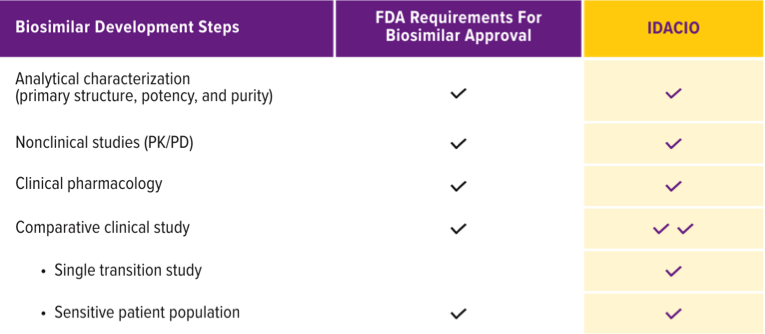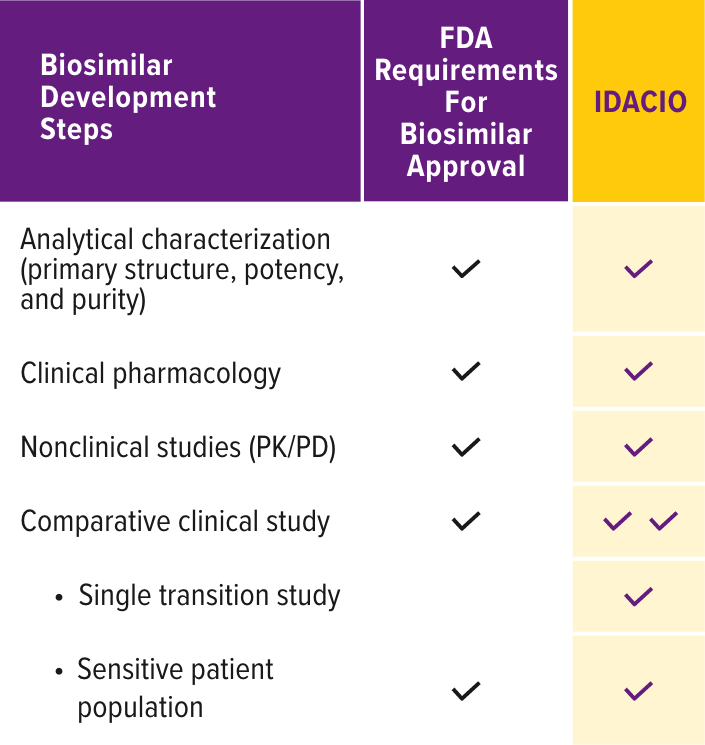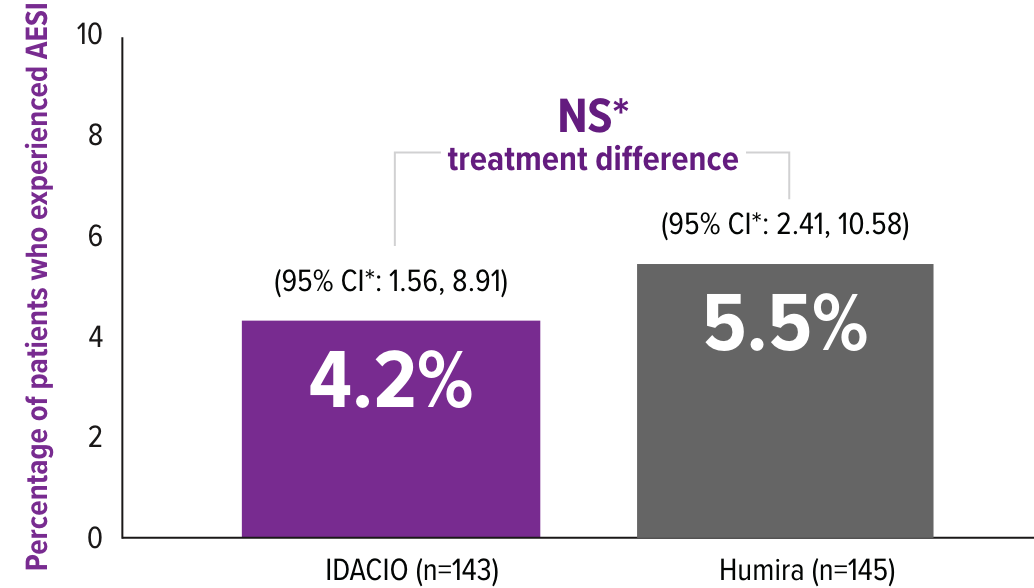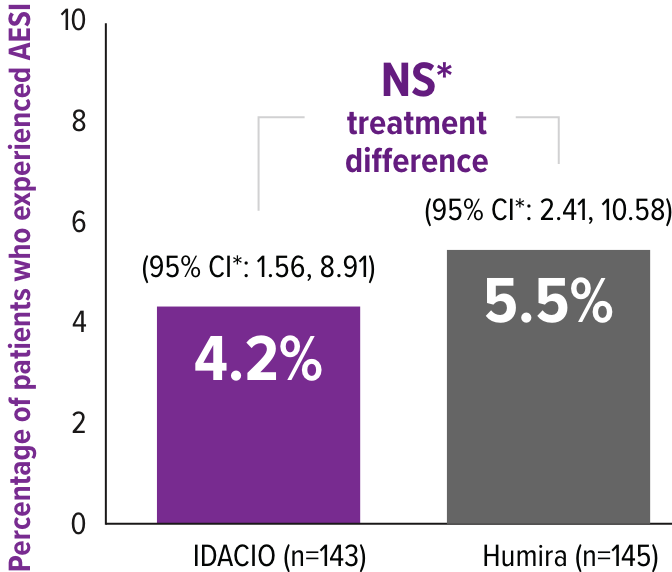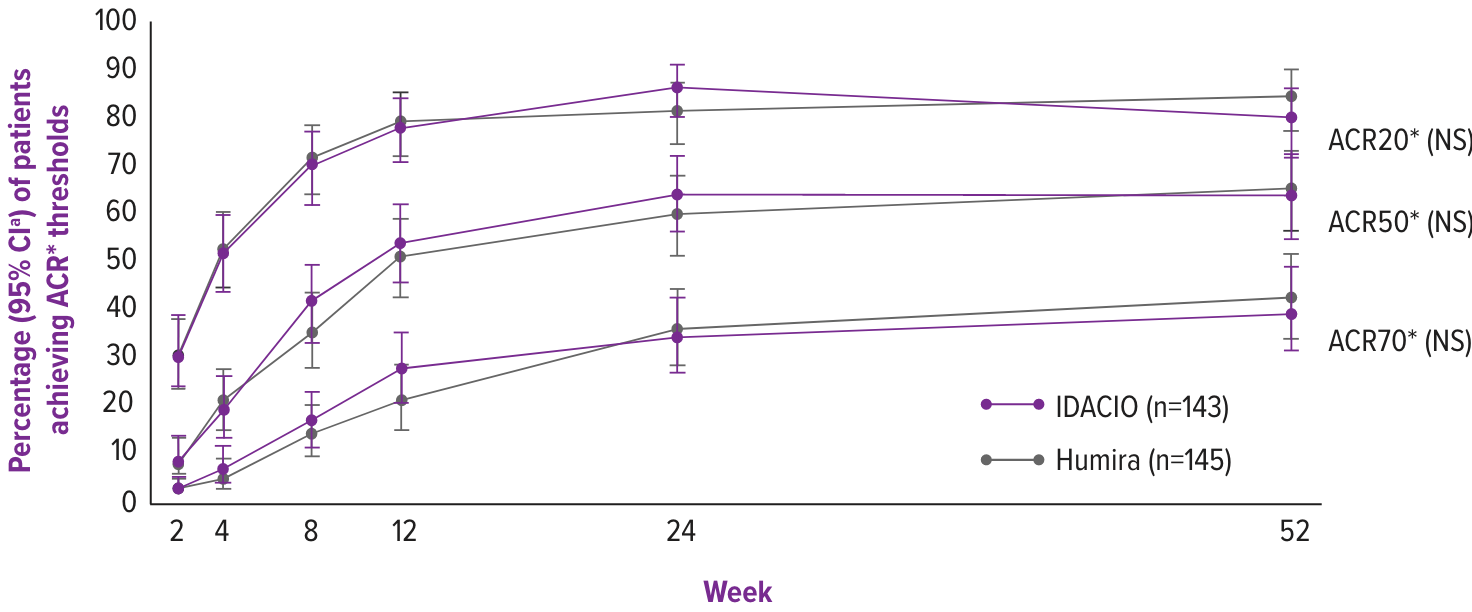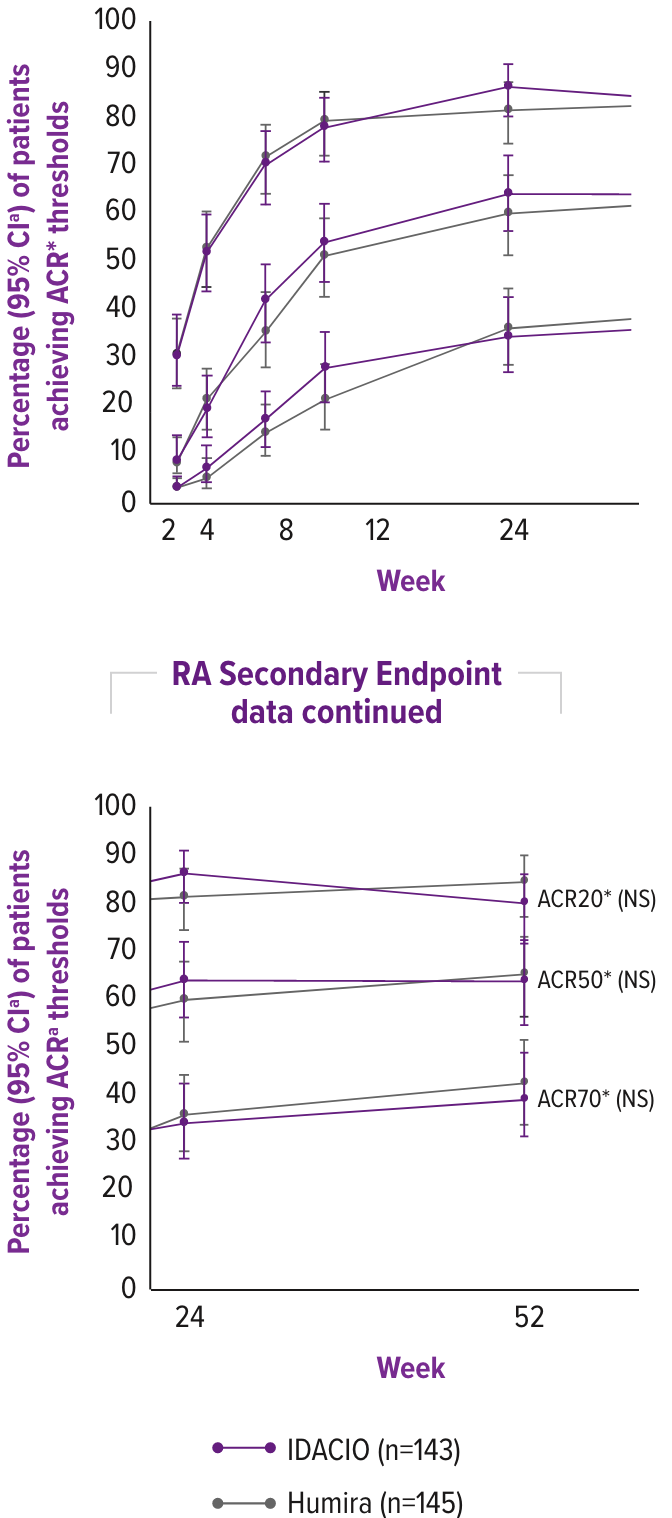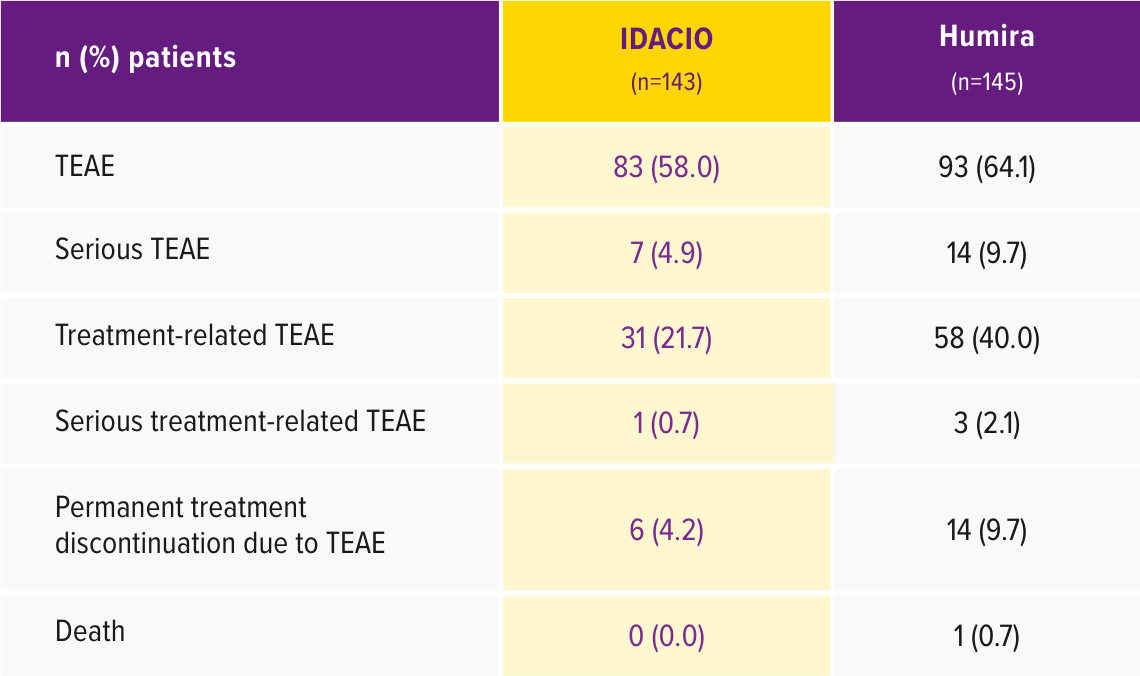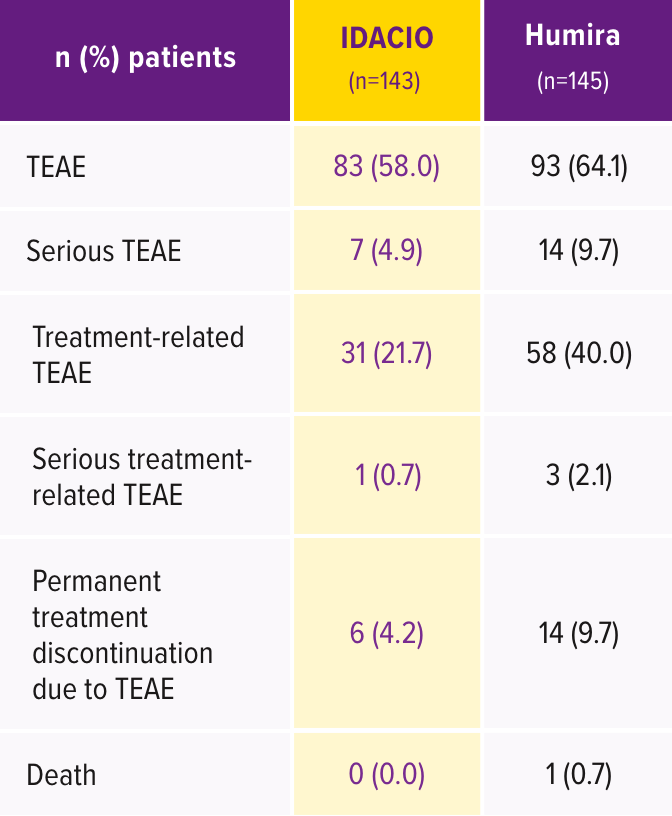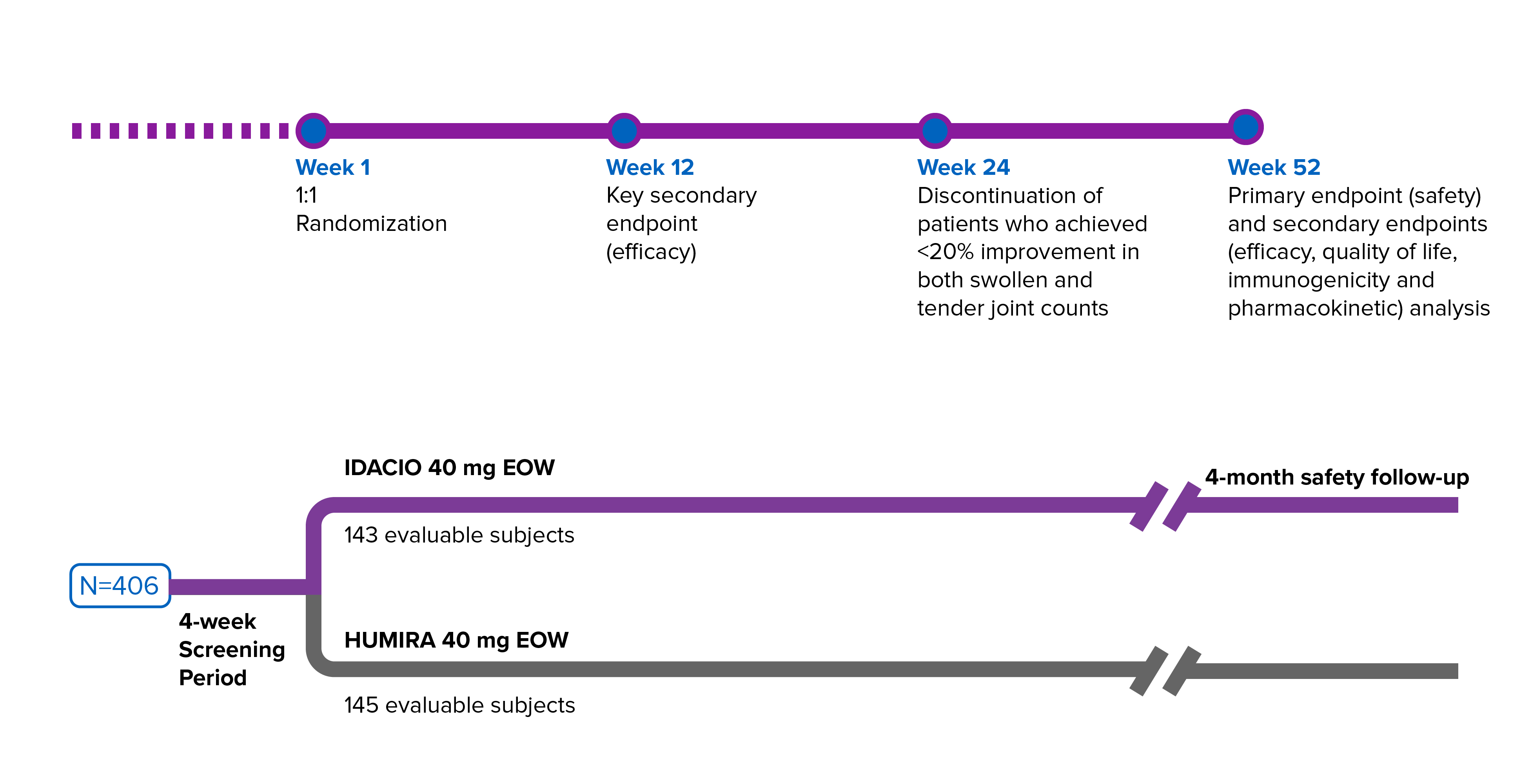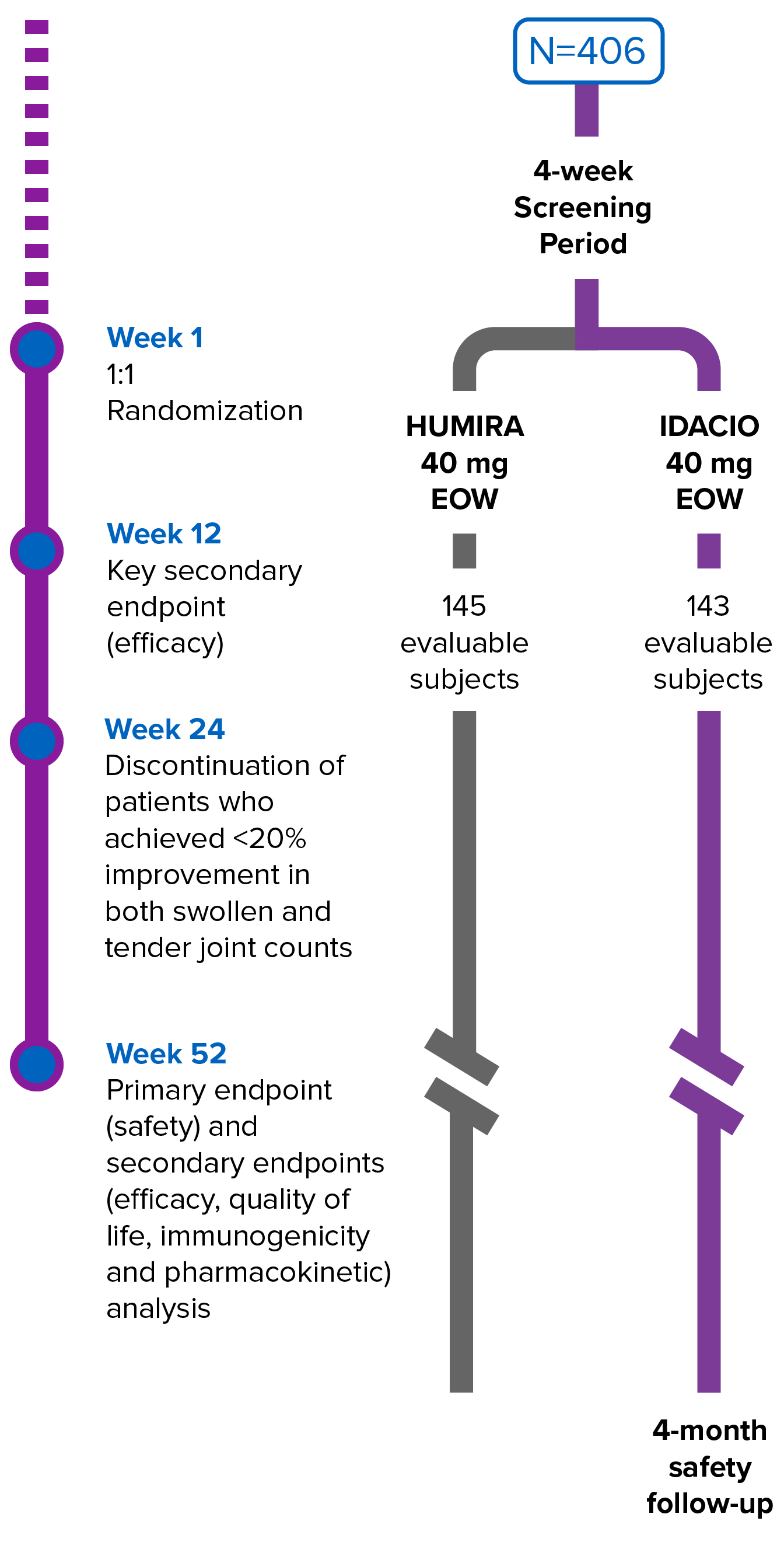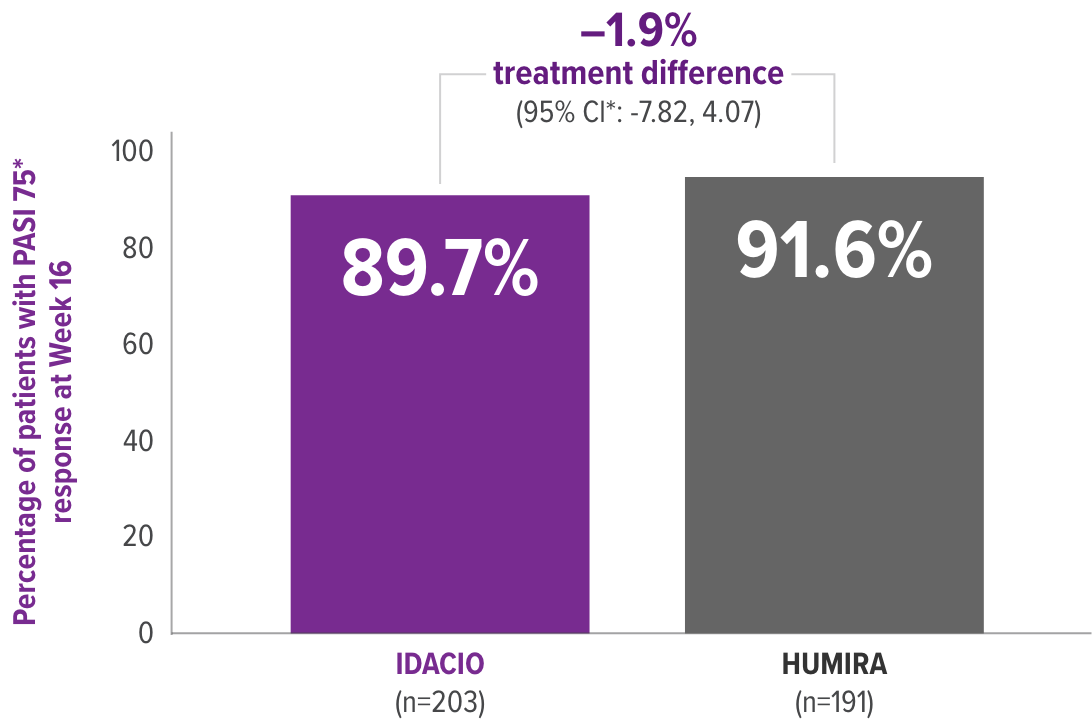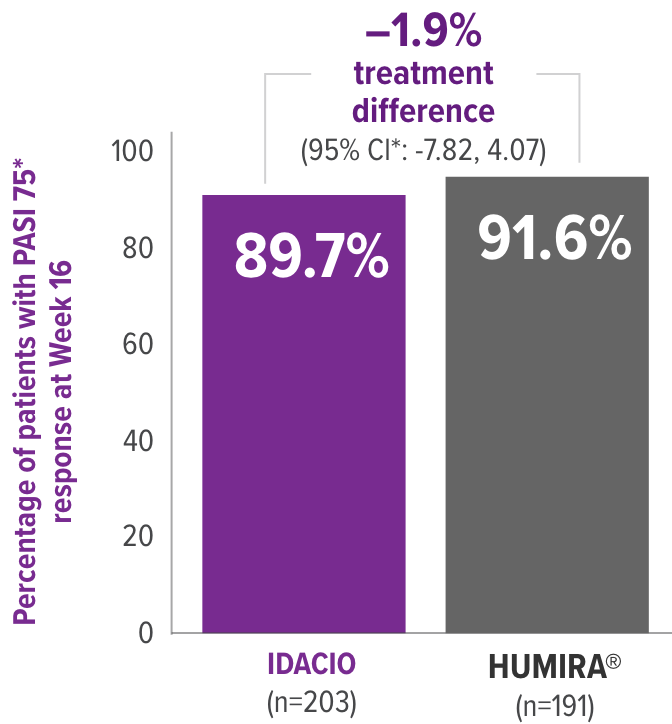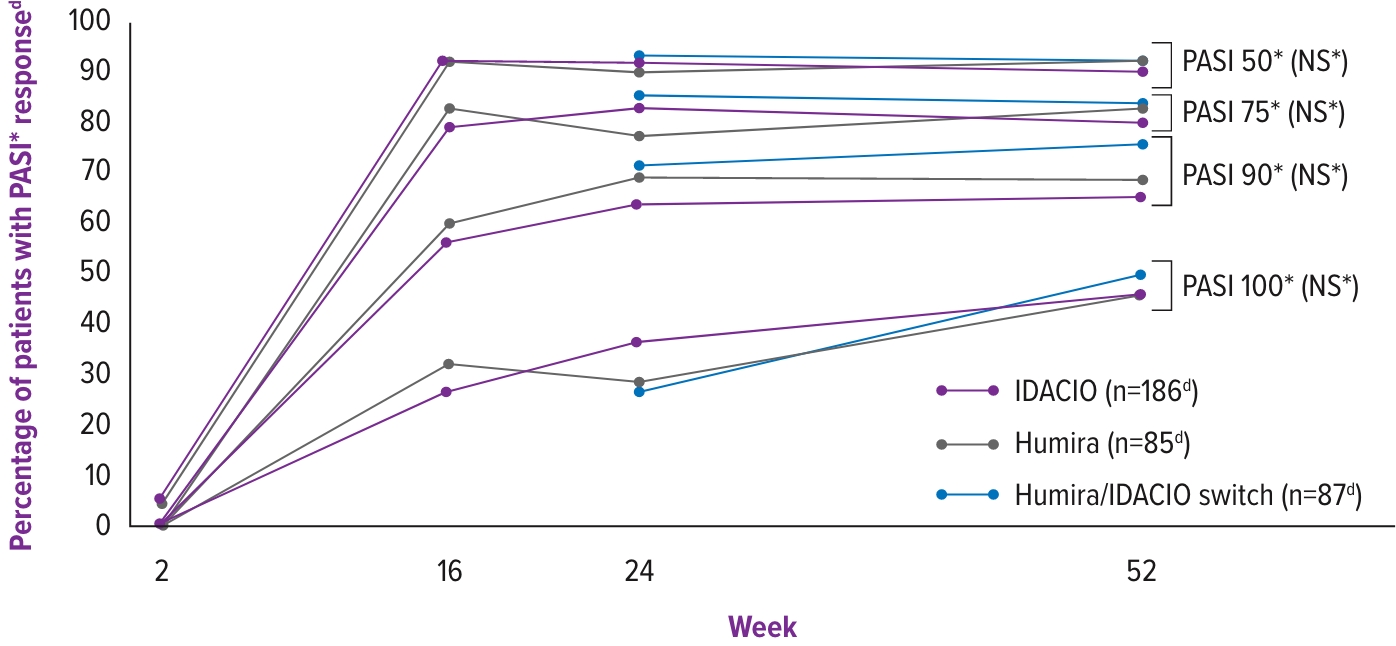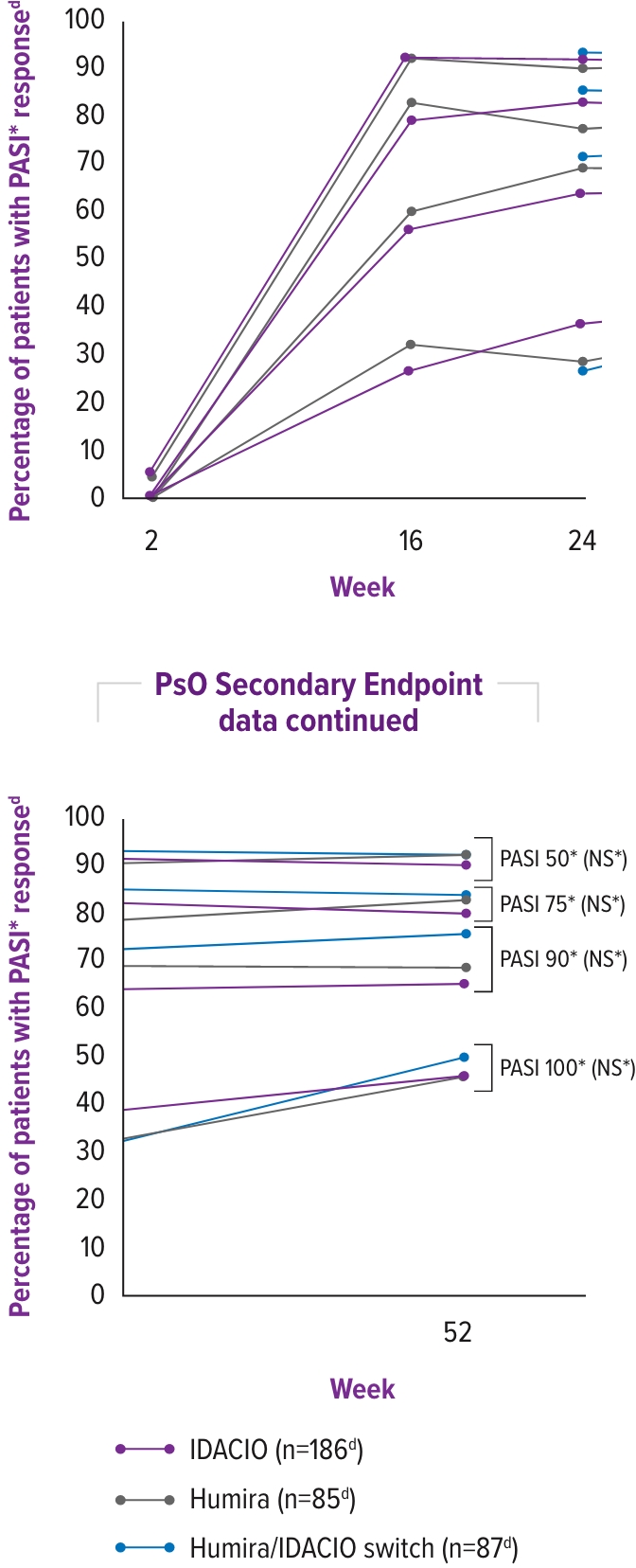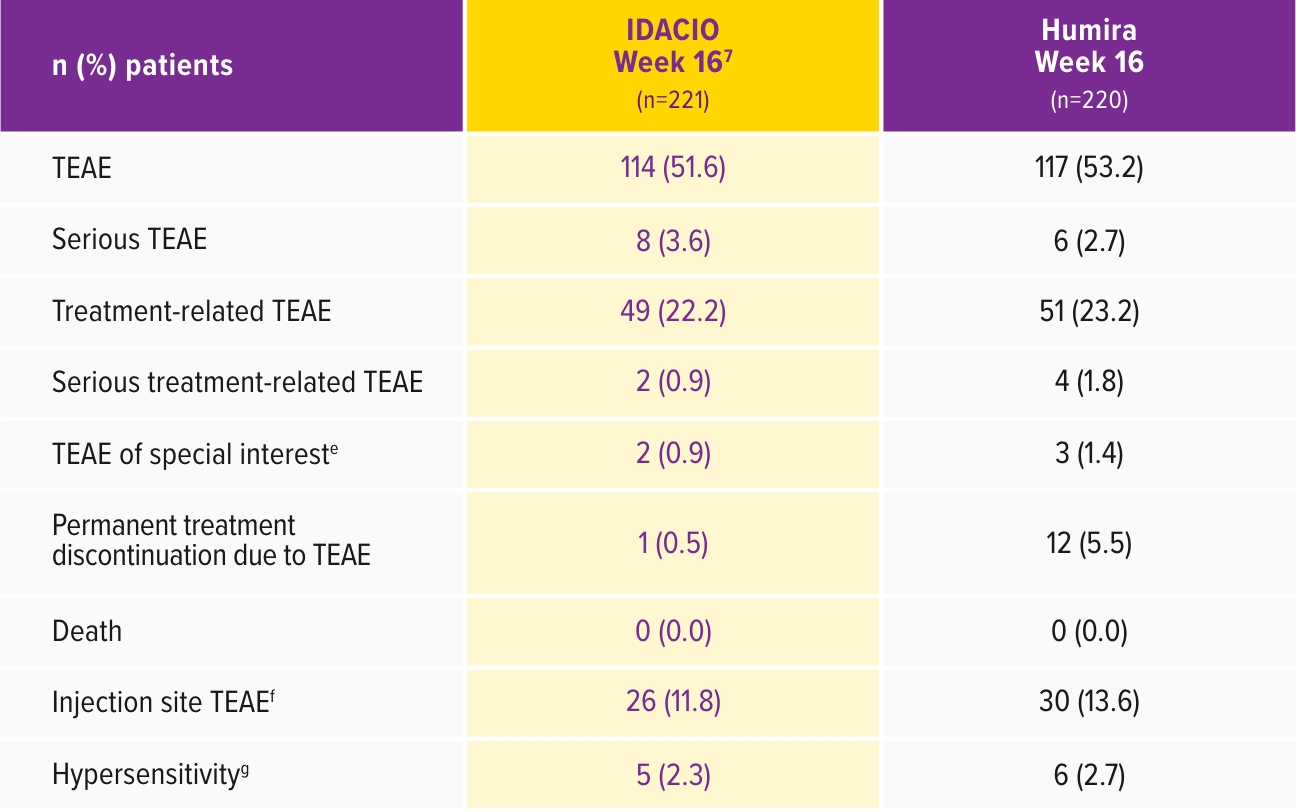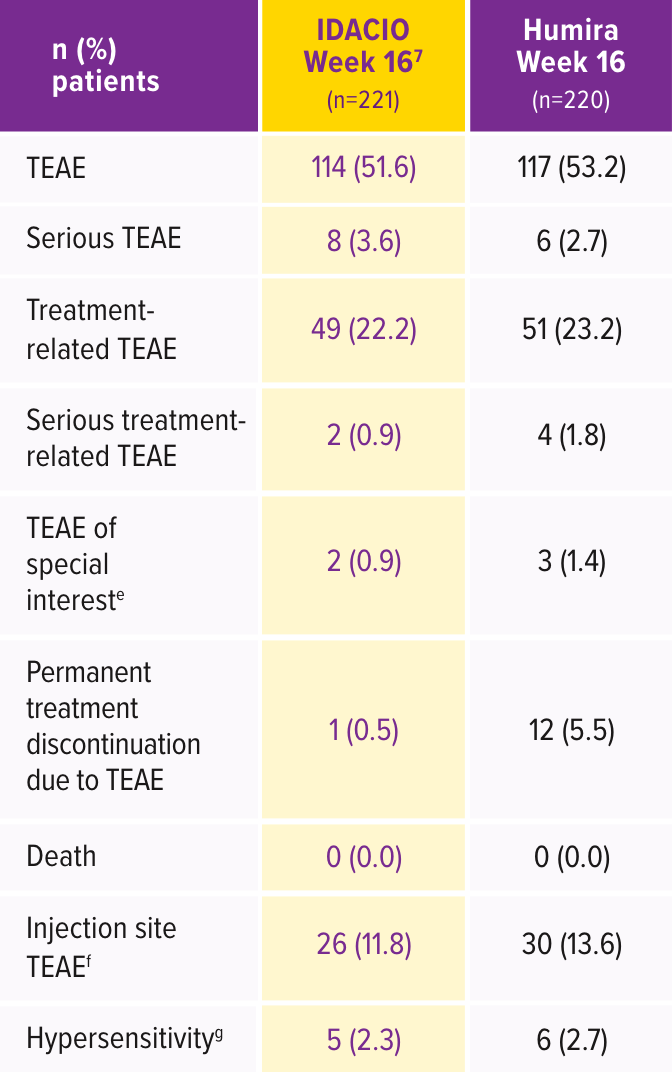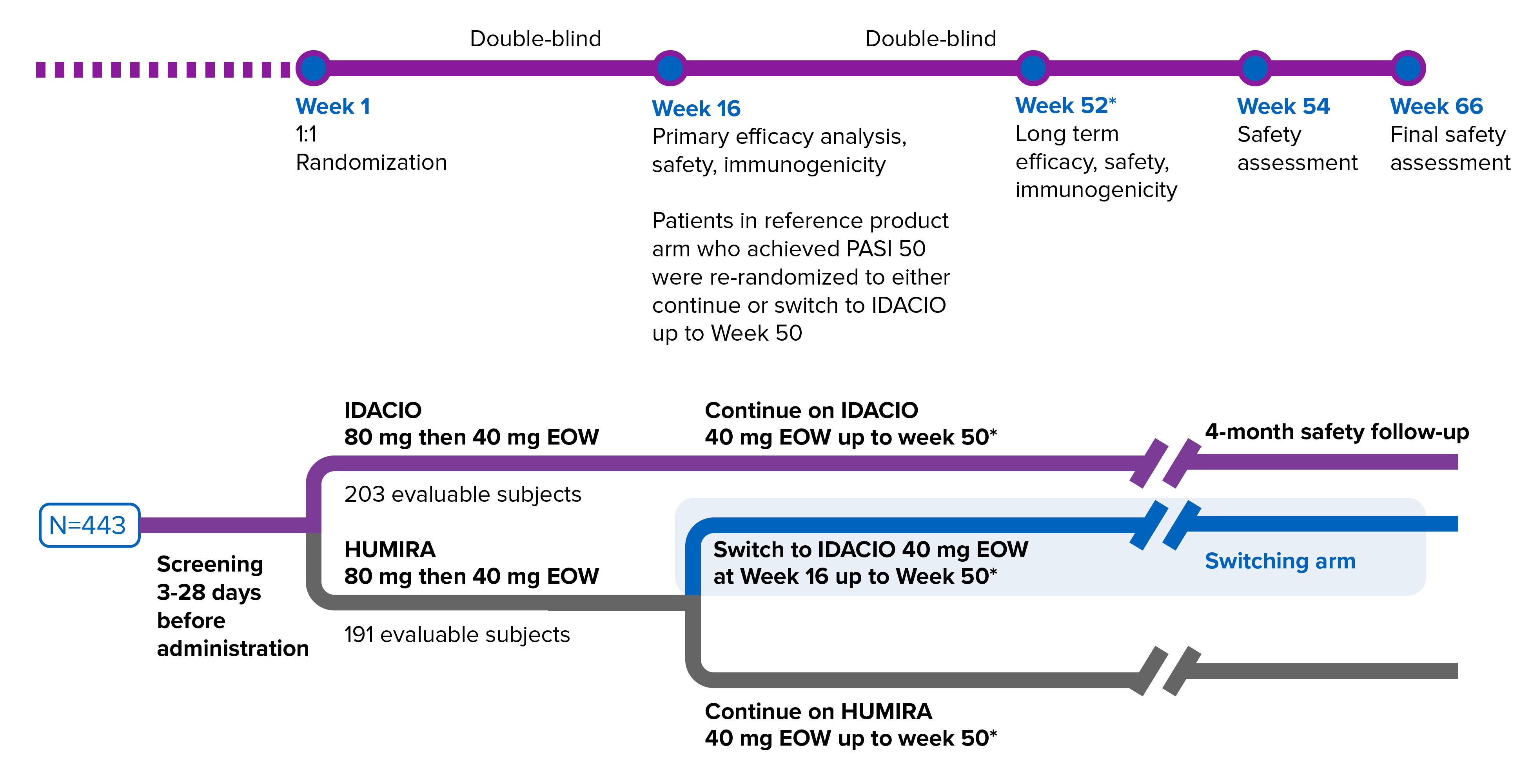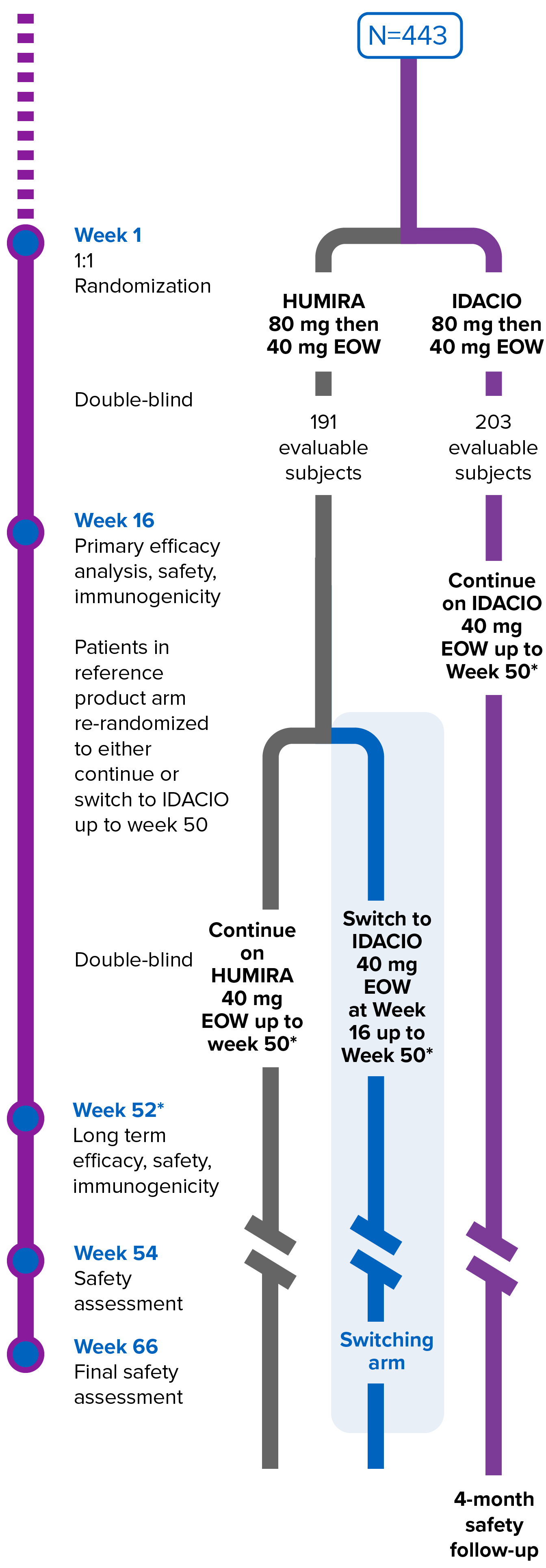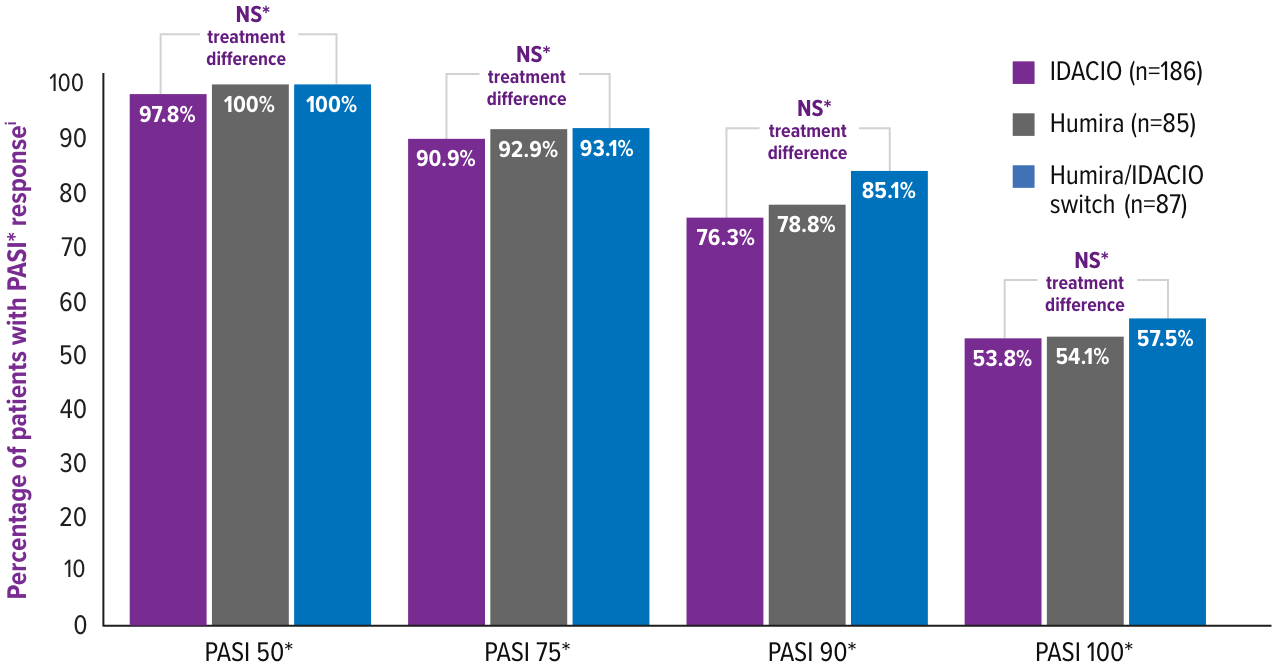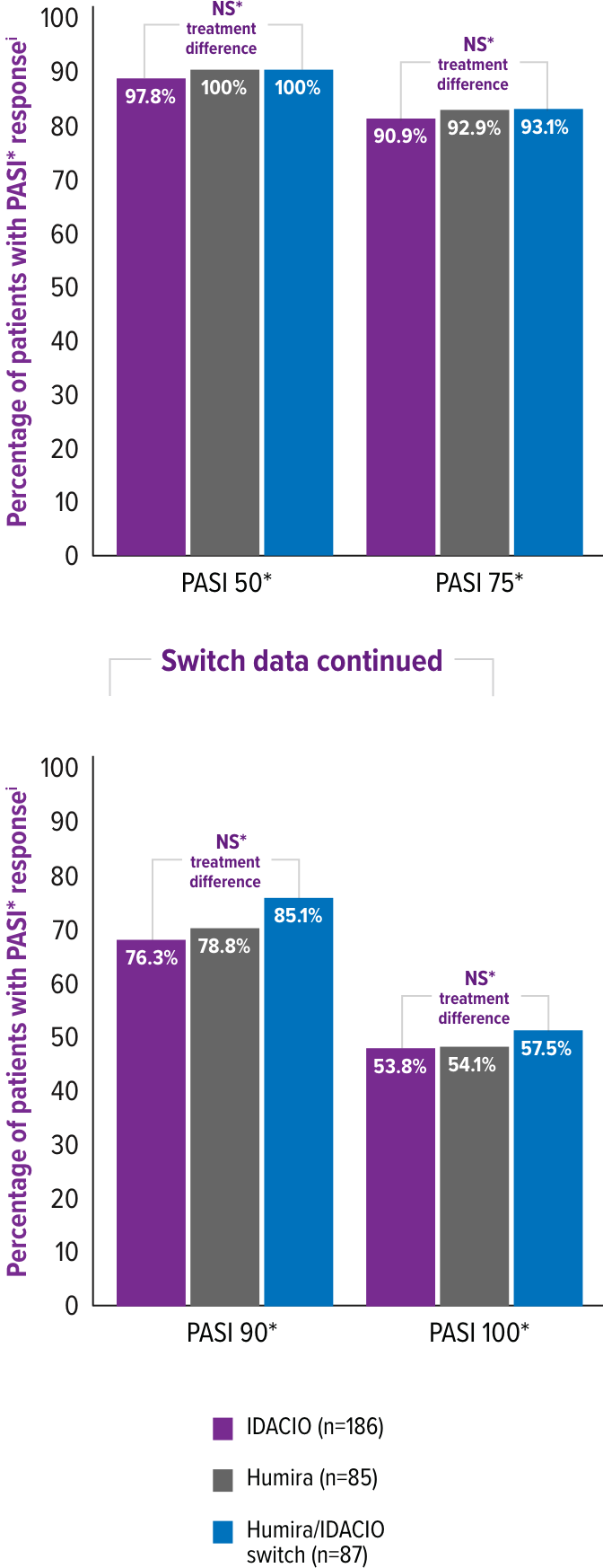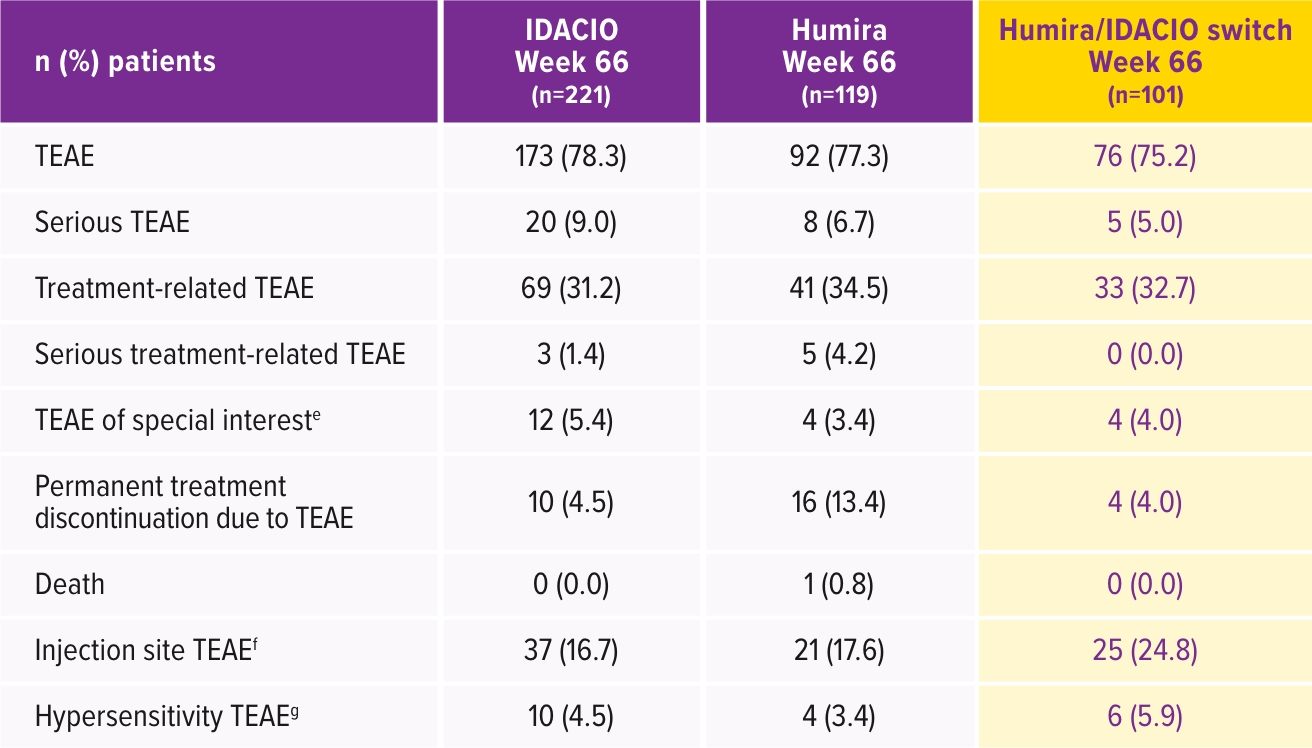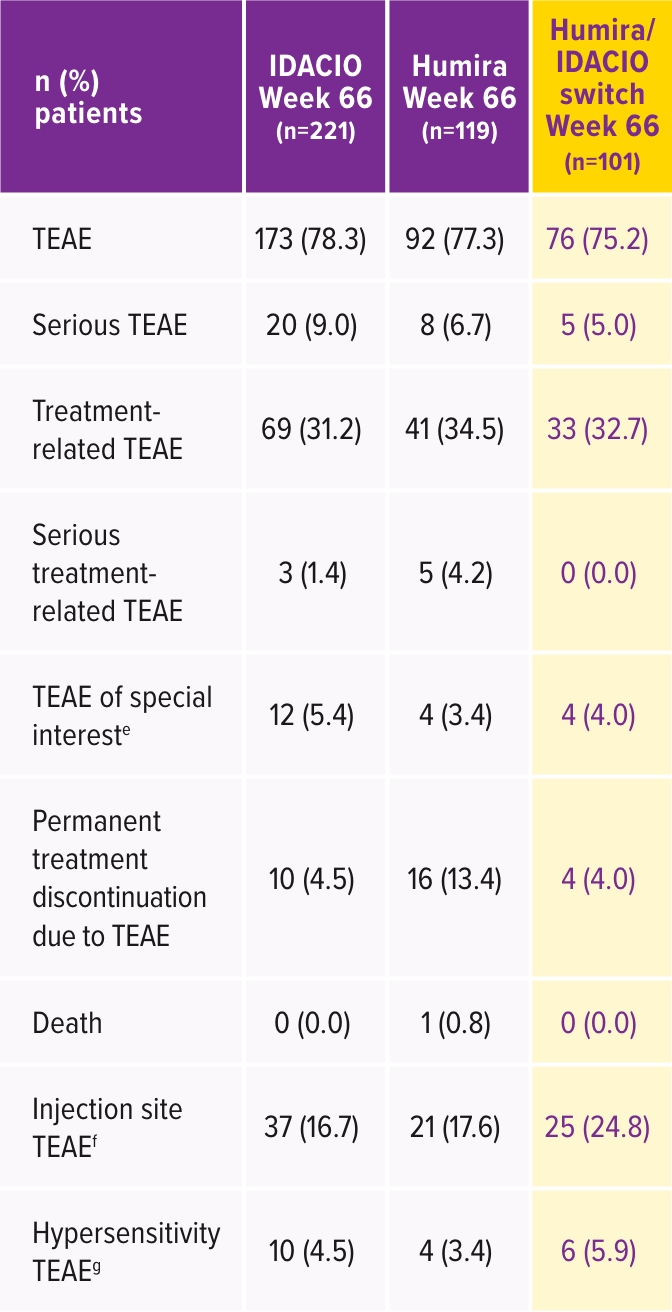INDICATIONS
-
IDACIO is indicated for reducing signs and symptoms, inducing major clinical response, inhibiting the progression of structural damage, and improving physical function in adult patients with moderately to severely active rheumatoid arthritis. IDACIO can be used alone or in combination with methotrexate or other non-biologic disease-modifying anti-rheumatic drugs (DMARDs).
-
IDACIO is indicated for reducing signs and symptoms of moderately to severely active polyarticular juvenile idiopathic arthritis in patients 2 years of age and older. IDACIO can be used alone or in combination with methotrexate.
-
IDACIO is indicated for reducing signs and symptoms, inhibiting the progression of structural damage, and improving physical function in adult patients with active psoriatic arthritis. IDACIO can be used alone or in combination with non-biologic DMARDs.
-
IDACIO is indicated for reducing signs and symptoms in adult patients with active ankylosing spondylitis.
-
IDACIO is indicated for the treatment of moderately to severely active Crohn’s disease in adults and pediatric patients 6 years of age and older.
-
IDACIO is indicated for the treatment of adult patients with moderate to severe chronic plaque psoriasis who are candidates for systemic therapy or phototherapy, and when other systemic therapies are medically less appropriate. IDACIO should only be administered to patients who will be closely monitored and have regular follow-up visits with a physician.
-
IDACIO is indicated for the treatment of moderately to severely active ulcerative colitis in adult patients.
Limitations of Use
The effectiveness of adalimumab products has not been established in patients who have lost response to or were intolerant to TNF blockers.
IMPORTANT SAFETY INFORMATION
SERIOUS INFECTIONS
Patients treated with IDACIO® (adalimumab-aacf) are at increased risk for developing serious infections that may lead to hospitalization or death. Most patients who developed these infections were taking concomitant immunosuppressants such as methotrexate or corticosteroids.
Discontinue IDACIO® if a patient develops a serious infection or sepsis.
Reported infections include:
-
Active tuberculosis (TB), including reactivation of latent TB. Patients with TB have frequently presented with disseminated or extrapulmonary disease. Test patients for latent TB before IDACIO® use and during therapy. Initiate treatment for latent TB prior to IDACIO® use.
-
Invasive fungal infections, including histoplasmosis, coccidioidomycosis, candidiasis, aspergillosis, blastomycosis, and pneumocystosis. Patients with histoplasmosis or other invasive fungal infections may present with disseminated, rather than localized, disease. Antigen and antibody testing for histoplasmosis may be negative in some patients with active infection. Consider empiric antifungal therapy in patients at risk for invasive fungal infections who develop severe systemic illness.
-
Bacterial, viral and other infections due to opportunistic pathogens, including Legionella and Listeria.
Carefully consider the risks and benefits of treatment with IDACIO® prior to initiating therapy in patients: 1. with chronic or recurrent infection, 2. who have been exposed to TB, 3. with a history of opportunistic infection, 4. who resided in or traveled in regions where mycoses are endemic, 5. with underlying conditions that may predispose them to infection. Monitor patients closely for the development of signs and symptoms of infection during and after treatment with IDACIO®, including the possible development of TB in patients who tested negative for latent TB infection prior to initiating therapy.
Treatment with IDACIO® should not be initiated in patients with an active infection, including localized infections.
Patients 65 years of age and older, patients with co-morbid conditions and/or patients taking concomitant immunosuppressants (such as corticosteroids or methotrexate), may be at greater risk of infection.
Discontinue IDACIO® if a patient develops a serious infection or sepsis. For a patient who develops a new infection during treatment with IDACIO®, closely monitor them, perform a prompt and complete diagnostic workup appropriate for an immunocompromised patient, and initiate appropriate antimicrobial therapy.
Drug interactions with biologic products: A higher rate of serious infections has been observed in RA patients treated with rituximab who received subsequent treatment with a TNF blocker. An increased risk of serious infections has been seen with the combination of TNF blockers with anakinra or abatacept, with no demonstrated added benefit in patients with RA. Concomitant administration of adalimumab products with other biologic DMARDs (e.g., anakinra or abatacept) or other TNF blockers is not recommended based on the possible increased risk for infections and other potential pharmacological interactions.
MALIGNANCY
Lymphoma and other malignancies, some fatal, have been reported in children and adolescent patients treated with TNF blockers, including adalimumab products. Post-marketing cases of hepatosplenic T-cell lymphoma (HSTCL), a rare type of T-cell lymphoma, have been reported in patients treated with TNF blockers including adalimumab products. These cases have had a very aggressive disease course and have been fatal. The majority of reported TNF blocker cases have occurred in patients with Crohn's disease or ulcerative colitis and the majority were in adolescent and young adult males. Almost all these patients had received treatment with azathioprine or 6-mercaptopurine concomitantly with a TNF blocker at or prior to diagnosis. It is uncertain whether the occurrence of HSTCL is related to use of a TNF blocker or a TNF blocker in combination with these other immunosuppressants
-
Consider the risks and benefits of TNF-blocker treatment prior to initiating or continuing therapy in a patient with known malignancy.
-
In clinical trials of some TNF-blockers, including adalimumab products, more cases of malignancies were observed among TNF-blocker-treated patients compared to control patients.
-
Non-melanoma skin cancer (NMSC) was reported during clinical trials for adalimumab-treated patients. Examine all patients, particularly those with a history of prolonged immunosuppressant or PUVA therapy, for the presence of NMSC prior to and during treatment with IDACIO®.
-
In adalimumab clinical trials, there was an approximate 3-fold higher rate of lymphoma than expected in the general U.S. population. Patients with chronic inflammatory diseases, particularly those with highly active disease and/or chronic exposure to immunosuppressant therapies, may be at higher risk of lymphoma than the general population, even in the absence of TNF blockers.
-
Postmarketing cases of acute and chronic leukemia were reported with TNF blocker use. Approximately half of the postmarketing cases of malignancies in children, adolescents, and young adults receiving TNF blockers were lymphomas; other cases included rare malignancies associated with immunosuppression and malignancies not usually observed in children and adolescents.
HYPERSENSITIVITY
Anaphylaxis and angioneurotic edema have been reported following administration of adalimumab products. If an anaphylactic or other serious allergic reaction occurs, immediately discontinue administration of IDACIO® and institute appropriate therapy. In clinical trials of adalimumab, hypersensitivity reactions (e.g., rash, anaphylactoid reaction, fixed drug reaction, non-specified drug reaction, urticaria) have been observed.
HEPATITIS B VIRUS REACTIVATION
Use of TNF blockers, including IDACIO®, may increase the risk of reactivation of hepatitis B virus (HBV) in patients who are chronic carriers of this virus. In some instances, HBV reactivation occurring in conjunction with TNF blocker therapy has been fatal.
Evaluate patients at risk for HBV infection for prior evidence of HBV infection before initiating TNF blocker therapy.
Exercise caution in prescribing TNF blockers for patients identified as carriers of HBV.
In patients who develop HBV reactivation, stop IDACIO® and initiate effective anti-viral therapy with appropriate supportive treatment. The safety of resuming TNF blocker therapy after HBV reactivation is controlled is not known. Therefore, exercise caution when considering resumption of IDACIO® therapy in this situation and monitor patients closely.
NEUROLOGICAL REACTIONS
Use of TNF blocking agents, including adalimumab products, has been associated with rare cases of new onset or exacerbation of clinical symptoms and/or radiographic evidence of central nervous system demyelinating disease, including multiple sclerosis (MS) and optic neuritis, and peripheral demyelinating disease, including Guillain-Barré syndrome.
Exercise caution in considering the use of IDACIO® in patients with pre-existing or recent-onset central or peripheral nervous system demyelinating disorders; discontinuation of IDACIO® should be considered if any of these disorders develop.
HEMATOLOGICAL REACTIONS
Rare reports of pancytopenia, including aplastic anemia, have been reported with TNF blockers. Medically significant cytopenia has been infrequently reported with adalimumab products.
Consider stopping IDACIO® if significant hematologic abnormalities occur.
CONGESTIVE HEART FAILURE
Worsening or new onset congestive heart failure (CHF) may occur; exercise caution and monitor carefully.
AUTOIMMUNITY
Treatment with adalimumab products may result in the formation of autoantibodies and, rarely, in development of a lupus-like syndrome. Discontinue treatment if symptoms of a lupus-like syndrome develop.
IMMUNIZATIONS
Patients on IDACIO® should not receive live vaccines. Pediatric patients, if possible, should be brought up to date with all immunizations before initiating IDACIO® therapy. The safety of administering live or live-attenuated vaccines in infants exposed to adalimumab products in utero is unknown. Risks and benefits should be considered prior to vaccinating (live or live-attenuated) exposed infants.
ADVERSE REACTIONS
The most common adverse reactions in adalimumab clinical trials (>10%) were: infections (e.g. upper respiratory, sinusitis), injection site reactions, headache and rash.
INDICATIONS
-
Rheumatoid Arthritis (RA): reducing signs and symptoms, inducing major clinical response, inhibiting the progression of structural damage, and improving physical function in adult patients with moderately to severely active RA.
-
Juvenile Idiopathic Arthritis (JIA): reducing signs and symptoms of moderately to severely active polyarticular JIA in patients 2 years of age and older.
-
Psoriatic Arthritis (PsA): reducing signs and symptoms, inhibiting the progression of structural damage, and improving physical function in adult patients with active PsA.
-
Ankylosing Spondylitis (AS): reducing signs and symptoms in adult patients with active AS.
-
Crohn’s Disease (CD): treatment of moderately to severely active Crohn’s disease in adults and pediatric patients 6 years of age and older.
-
Ulcerative Colitis (UC): treatment of moderately to severely active ulcerative colitis in adult patients.
Limitations of Use: Effectiveness has not been established in patients who have lost response to or were intolerant to TNF blockers.
-
Plaque Psoriasis (PsO): treatment of adult patients with moderate to severe chronic plaque psoriasis who are candidates for systemic therapy or phototherapy, and when other systemic therapies are medically less appropriate.




